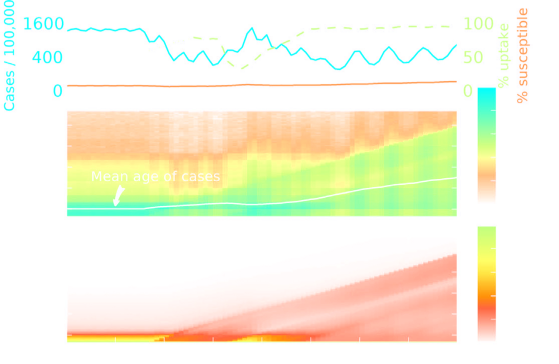Can vaccine legacy explain the British pertussis resurgence?

Pertussis incidence has been rising in some countries, including the UK, despite sustained high vaccine coverage. We questioned whether it is possible to explain the resurgence without recourse to complex hypotheses about pathogen evolution, subclinical infections, or trends in surveillance efficiency. In particular, we investigated the possibility that the resurgence is a consequence of the legacy of incomplete pediatric immunization, in the context of cohort structure and age-dependent transmission. We constructed a model of pertussis transmission in England and Wales based on data on age-specific contact rates and historical vaccine coverage estimates. We evaluated the agreement between model-predicted and observed patterns of age-specific pertussis incidence under a variety of assumptions regarding the duration of immunity. Under the assumption that infection-derived immunity is complete and lifelong, and regardless of the duration of vaccine-induced immunity, the model consistently predicts a resurgence of pertussis incidence comparable to that which has been observed. Interestingly, no resurgence is predicted when infection- and vaccine-derived immunities wane at the same rate. These results were qualitatively insensitive to rates of primary vaccine failure. We conclude that the alarming resurgence of pertussis among adults and adolescents in Britain and elsewhere may simply be a legacy of historically inadequate coverage employing imperfect vaccines. Indeed, we argue that the absence of resurgence at this late date would be more surprising. Our analysis shows that careful accounting for age dependence in contact rates and susceptibility is prerequisite to the identification of which features of pertussis epidemiology want additional explanation.
